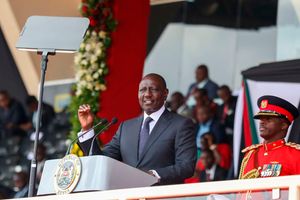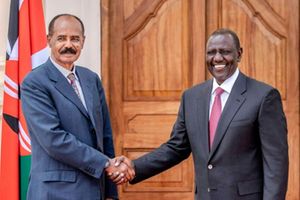Inside the initiatives started in 2024 for an FGM-free future

Call to end female genital mutilation.
What you need to know:
- Transformative initiatives challenge harmful traditions, promoting girls' education, leadership, and a future without FGM.
- Collaborations empower communities, using cultural shifts and awareness to eliminate FGM and protect girls' rights.
This year saw the launch of several initiatives aimed to eradicate female genital mutilation (FGM). Despite significant progress, FGM remains a challenge in Kenya. While national prevalence among women aged 15-49 has declined from 32 per cent in 2003 to 15 per cent in 2022, certain regions still record high rates exceeding 70 per cent.
Persistent challenges such as deep-seated cultural and religious beliefs and emerging trends such as medicalisation and cross-border practices hinder eradication efforts.
Break the Blade Campaign
This year, Nguvu Collective, Anti-FGM Board and the Kenya Women Parliamentary Association launched a new initiative that sought to eradicate FGM. The #BREAKTHEBLADE campaign was a collective effort to mobilise support and action against this dehumanising ritual.
Highlighted by a symbolic “breaking of the blade” activity, the launch of the campaign brought together policymakers, survivors, activists, and community leaders to reinforce a united front.
Nguvu Change Leaders and survivors, Selina Nkoile and Naomy Kolian have been spearheading the campaign, which called for collaboratiion to eliminate FGM, with leaders emphasising the need to protect and empower future generations.
Speaking during the launch of the campaign in Nairobi in October, Preethi Herman, the CEO of Nguvu Collective, said there was power in collective action among policymakers and civil society partners.
“Nguvu Change Leaders Selina Nkoile and Naomy Kolian at the forefront of the #BREAKTHEBLADE campaign are survivors of FGM, who have emerged as strong anti-FGM activists in their counties because they don’t want any girl to undergo the trauma they were subjected to. Their strong personal stories have inspired other activists to support them. Efforts to end FGM cannot exist in isolation and we need to have collaborations,” Preethi said.
She added that every cut that results in a scar was a violation of a girl's fundamental rights. “Every blade broken is a life saved from irreversible trauma. That's why we are doing this, as a reminder and call to action for people to take a stand with us. We want to send a clear message that FGM robs millions of their childhood and future.”
Anti-FGM Board Chief Executive Officer Bernadette Loloju noted that the government had put laws and policies in place to tackle FGM. “Kenya is the only country with an anti-FGM board. The Anti-FGM Board is working on a safeguarding policy, which we will be sharing. We will bring all stakeholders on board and emphasise it is important for us to know how we speak about FGM.”
Kisii Woman Representative Donya Aburi said she had sponsored the Sexual Offences Amendment Bill, 2023, to make the existing law more punitive. “I have a bill in Parliament and I want to amend the Sexual Offences Bill so that we can have countrywide awareness being spearheaded by the Ministry of Education on FGM, teenage pregnancies, drugs and substance abuse, and gender issues.”
Samburu West MP Naisula Lesuuda termed it important to end the stigma faced by women from communities that practise FGM so that they do not fear that they cannot be leaders, cannot get married or participate in important issues in society.
Dear Daughter Campaign
This campaign was launched during the celebrations to mark International Day of the Girl on October 11, 2024. It is the brainchild of the Anti-FGM Board to sensitise mothers to stop passing on the FGM trauma to their daughters. It is a generational declaration by mothers to protect their daughters from FGM for a future free from the vice.
Anti-FGM Board CEO Loloju said the campaign is encouraging mothers who underwent the cut to write letters to their daughters and protect them from the harmful practice. The campaign also involves girls who have been saved from FGM to create their own movement called ‘Daughters against FGM’ where they are standing up for themselves and denounce the practice.
The campaign requires mothers to write letters to their daughters about FGM, vowing not to allow them to be cut, a move to see the passing of the generational button of ending FGM among their families and communities. The letter reads, “Dear daughter, even though I went through FGM trauma, I will not let you go through the same…”
“Mothers are better placed to protect their daughters than anybody else because we cannot place a police officer in every household, but a mother can be the best protection for her daughter,” Loloju told Nation.Africa.
Board Chairperson Ipato Surum said the campaign would ensure mothers protect their girls, who will, in turn, become champions against the vice. Ipato, who vividly remembered the day she underwent the cut, said it deprives girls of their health and dignity and would not wish any girl to go through the trauma.
“Young girls are not just passive recipients of collaborative efforts but are also architects of the future. When we listen to their stories, their aspirations, and their desires, we realise they have the solutions we seek,” she said.
Komesha FGM Sasa Campaign
This initiative, a collaboration between the European Union (EU) and the United Nations Population Fund (UNFPA), was launched in December. The three-year campaign seeks to accelerate efforts to end FGM. It is designed to support Kenya’s efforts.
The initiative aims to address these challenges through the engagement of frontline activists and civil society organisations while collaborating with national and county institutions. The Komesha FGM Sasa! programme supports FGM elimination efforts in seven hotspot counties of Garissa, Isiolo, Marsabit, West Pokot, Elgeyo Marakwet, and Tharaka Nithi.
EU Ambassador to Kenya Henriette Geiger said by partnering with frontline activists in Kenya, communities will be actively engaged in delivering vital prevention and response services and ensuring that survivors play a meaningful and active role in shaping and contributing to all efforts aimed at ending FGM.
“Through this partnership with the EU, UNFPA reaffirms its commitment to realising a Kenya where no girl or woman faces the trauma of FGM. This programme will prioritise the voices of women and girls, fostering an environment where their rights and aspirations take precedence over harmful practices,” said Anders Thomsen, UNFPA Representative in Kenya.
Sabaot Elders' Declaration
This year, the Supreme Council of Sabaot elders denounced FGM and child marriage and committed to supporting government efforts to end the vice. The six sub-clans of the Sabaot, Someek, Agiek, Bong’omek, Bok, Koony and Sabiny, led by the supreme council signed a declaration to end FGM and all forms of harmful cultural practices that endanger women and girls.
The elders led efforts to embrace alternative rites of passage that emphasise dignity, respect and honour for women and girls by eliminating cultural biases that cause stigma and discrimination. They further committed to protecting their daughters from child marriage, noting that FGM, besides causing physical, emotional and psychological pain, is the precursor of early marriage, teenage pregnancies and high school dropout rates.
They in particular committed to supporting girls’ education to make them equal to their male counterparts.
Gender Principal Secretary Ann Wang’ombe, who witnessed the declaration, termed it momentous, lauding the council and the entire community for the move. “Ending FGM is both a legal and social imperative that cannot wait any longer.”
The declaration becomes the fourth public pronouncement by community elders to unite against FGM. Other pronouncements include the Alale Declaration by the Pokot elders, and Loita and Kisima declarations by the Maasai and Samburu elders respectively.
The historic Kisima declaration was witnessed by former President Uhuru Kenyatta. Samburu is one of the communities where the practice is rampant.
The Samburu elders lifted a cultural curse on girls who have not undergone the cut. The curse has been one of the drivers of FGM as girls opt to face FGM for social acceptance. The lifting of the curse now means that girls who had not been cut can be accepted in the community and can participate in cultural celebrations, activities and other rites.
The elders took Mr Kenyatta through the Samburu cultural rite as they lifted the curse.
Tony Mwebia, co-founder of Men End FGM Foundation, said in an interview that the declaration by the Sabaot elders is a great step towards ending FGM. “The event serves the purpose of popular mobilisation and should be popularised through local media engagements and baraza. This will allow organised diffusion to take place within the community and ensure everyone is aware of the bold step taken by the elders.”
According to the recently released Kenya Demographic & Health Survey (KDHS) data for 2022, the prevalence of FGM is 15 per cent in the country. The survey further showed that nine per cent of girls and young women aged 15–19 had undergone FGM, as compared to 23 per cent of women aged 45–49. However, the national prevalence has reduced compared to 2014, when the prevalence was 21 per cent, and in 1998 (38 per cent).
According to research released in 2023 by Nature Scientific Reports, more than 44,000 girls and women in Africa die yearly from FGM. The study revealed that FGM perpetuates obstetric complications, diminished sexual function, and enhanced physical and mental health complications.
Unicef estimates that at least 200 million girls and women alive today have been subjected to FGM in 30 countries in Africa, the Middle East and Asia. A further 68 million are at risk of being cut by 2030.
Although rates of FGM are declining in most of the 31 countries where it is practiced, population growth rates in many settings mean the absolute numbers of girls who will be cut will continue to grow if the practice continues at current levels.





